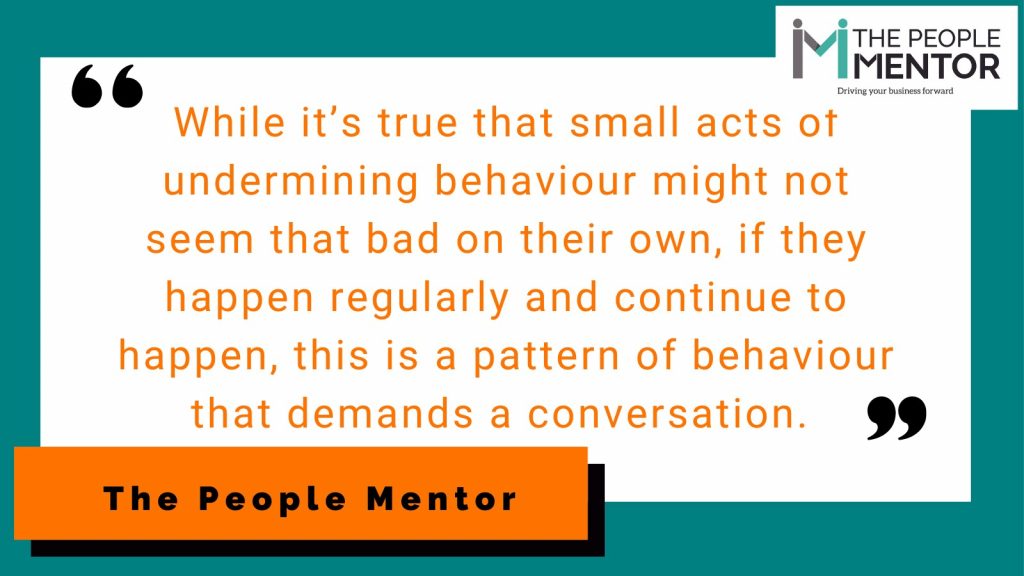Hi, I’m Nicola from The People Mentor.
In today’s podcast, I’m going to answer a question that someone has asked me about difficult conversations. This question is about how to deal with a co-worker who undermines you.
Hopefully, I’ll shed some light on some of the issues you’ve come across and you’ll take away something that’s really going to help you.
So here goes…
“ Hi, Nicola,
I have a co-worker I am joint leading on projects with but they are undermining me, not sharing information, and aiming to make me look as if I am doing a rubbish job. How do I approach this conversation and who with?”
Being happy at work is not just about being happy with your job, it’s about feeling comfortable and supported in the working environment too. Having good working relationships with your colleagues often equals a high level of job satisfaction and good performance. But when conflict arises or relationships aren’t so good, it can have a negative impact on morale, job satisfaction, and performance.
One complaint I hear often is people saying their co-workers undermine them. At the very least, this can make someone feel isolated and ignored. In more serious cases, it impacts mental health and can even make someone consider leaving their job.

The tricky things with undermining behaviour are;
Number one, distinguishing it from simple competitive behaviour which can be normal in organisations,
And number two, worrying about mentioning someone’s behaviour for fear that you’ll seem ‘petty’ or that it will be dismissed as a personality clash. While it’s true that small acts of undermining behaviour might not seem that bad on their own, if they happen regularly and continue to happen, this is a pattern of behaviour that demands a conversation.
Yes, it will be a difficult conversation, but it’s better to address issues head-on and address them with the right people so you don’t get into a situation where you dread going to work every day.
First things first, let’s look at what counts as undermining behaviour.
It could be that your co-worker undermines you by being openly critical of you in front of others.
They might be claiming credit for work that you have done.
They could be keeping you out of the loop and not sharing important information.
You might find that you’re being left off email threads or not being invited to project meetings.
It could be that a co-worker is publicly and deliberately sharing mistakes you’ve made.
Or interrupting you or contradicting you when you’re speaking to make you doubt yourself or to make others doubt you.
They might also downplay your contribution to projects or challenge you or your work in a negative way.
Have you been on the receiving end of this sort of behaviour?
It’s not an easy situation to find yourself in and it’s not an easy thing to deal with.
There are things you can do before the situation escalates to the point where your mental health is affected and you consider leaving your job.
On a practical level, make a note of each occasion when a co-worker undermines you. This should include what happened, the time and date, and whether there were any witnesses. Keep details of any emails or conversations which demonstrate undermining behaviour.
Then, you should consider addressing the issue directly with your co-worker. At this stage, it can be a private chat where you can hopefully have an open and honest conversation about how their behaviour is affecting you. There is a chance that they may not be aware of the impact of their behaviour, so talking to them about it can give them a chance to see things from your perspective.
When you’re having the conversation, stick to the facts. This is where keeping a note of what has happened can come in handy. Share recent examples of things they’ve said and done and explain how it made you feel.
Once you’ve shared examples of the undermining behaviour, stay calm and ask your co-worker to clarify what they meant by what they said or did. So for example, if your co-worker publicly said something negative about you or your work, ask what they meant by it. This might make them stop and think about how you could have perceived this and how they would feel if the shoe was on the other foot.

Another thing that can help is to reflect on what could be behind the undermining behaviour.
Could it be that your co-worker is jealous of you? Are they really competitive and just going about things the wrong way?
Or are they actually quite insecure deep down?
None of these are excuses for treating you poorly, but if you take the time to consider the ‘whys,’ you may find that any difficult conversation becomes a little easier to approach.
But what happens when your co-worker either becomes too confrontational to have a conversation or you just don’t feel comfortable approaching them directly?
If it’s past the point of having a simple conversation to resolve things, then it’s time to involve your manager. If your co-worker is not sharing information with you about a project, for example, you can try emailing them to ask for it and cc your manager.
This can make the co-worker less likely to ignore your request. You’ll also have evidence of undermining behaviours and it might alert your manager to the fact that something is going on.
If things don’t improve, have a conversation with your manager. Explain what has been going on and provide them with evidence such as the co-worker’s words and actions, the date and time of the incident, and whether or not any other colleagues witnessed it.
It may be that you don’t ask your manager to intervene, but instead, you ask for their advice on how to improve your working relationship with the co-worker in question, and what you should do if things don’t improve.
Hopefully, you will leave their office with the support and advice you need, and remember, if undermining behaviours stem from a toxic workplace culture, it’s your manager’s job to address this.
Dealing with office politics can be one of the most difficult challenges you’ll face in the workplace, especially if you’re the target of undermining behaviour.
If you find yourself in this situation, try your best to remain professional and bring the issues out into the open so they can be dealt with.
Do you feel like you need some support with having difficult conversations?
When it comes to thinking about what to say and how to say it, do you feel way out of your depth?
Are there issues that desperately need to be addressed but you can’t seem to pull off the plaster and have that difficult conversation?
My ‘Making Difficult Conversations Easier’ programme is about helping managers gain confidence to deal with team problems, hold difficult conversations, and build engagement to create an open, honest, and high-performing workforce.
Imagine having a team where nobody is scared to speak up about something, that performs better, and is productive, engaged, and profitable. Imagine that everyone wants to work together for the good of the business and no issue is insurmountable.
Imagine feeling more confident and in control.
It’s all possible.
Get in touch to book a discovery call.
That’s all from today’s podcast. I hope it gave you some food for thought and that it makes some of those difficult conversations you’ve been dreading feel that bit easier.
Goodbye for now, and see you next time.
Want to read more on difficult conversations?




